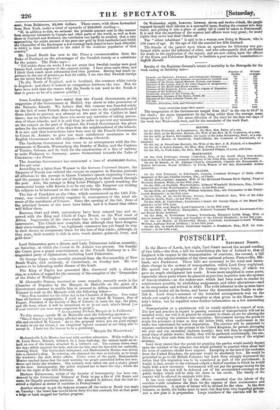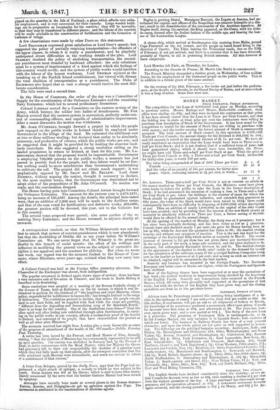POSTSCRIPT.
SATURDAY NIGHT.
Transportation as a punishment will be totally abolished in respect of men. The law and practice in regard to passing sentence of transportation will not be meddled with; nor will it at present be necessary to obtain an act for altering the mode of carrying the sentence into execution; Government having the power to retain the prisoners at home as they did before 1843, when confinement in the hulks was substituted for actual deportation. The convicts will be subjected to separate confinement in the prisons of the United Kingdom, for periods averaging one year and not exceeding eighteen months; they will then periods
employed om a penal class of public works; finally, they will be pardoned conditionally, the con- dition being their exile from this country for the remaining term of the original sentence.
Lord Grey stated that the period for granting the pardon would mainly depend upon the conduct of the prisoner, but would probably be granted when about half the term of sentence should have expired. Excepting in the fact of his exclusion from the United Kingdom, the prisoner would be absolutely free. He would be permitted to go to the British Colonies; but Lord Grey strongly deprecated the notion that this migration was to be considered as part of the punishment: it would, in fact, secure to the reformed culprit a field of exertion in which he would begin with a new character. Government will not pay the passage-money for the convict; but the cost will be defrayed out of his accumulated earnings on the public works; which will be duly set down to his credit. The family of the convict will be allowed to emigrate with him. It has been calculated by all the officers consulted that the labour of the convicts would reimburse the State for the expense of their maintenance and superintendence. A system of labour will be devised for the class. In the -first instance, no doubt, the hulks must be used; but they form very imperfect ,prisons, and a new plan is in preperation. Large numbers of the convicts will be em-
ployed on the quarries in the Isle of Portland; a place which affords very suita- ble employment, and is very convenient for their custody. Large wooden build- ings are in preparation as receptacles for the convicts; they will be moveable, so that they may be transferred to different places; and the labour of the convicts will be made available in the construction of fortifications and the formation of harbours of refuge.
A few observations were made by other Peers on this statement.
Lord BROUGHAM expressed great satisfaction at Lord Grey's speech; but suggested the policy of partially retaining transportation—for offenders of the upper classes, to whom it is really a punishment; and he playfully anticipated divers difficulties in the working details of the plan. Lord STANLEY doubted the policy of abolishing transportation, the second- ary punishment most dreaded by hardened offenders: the only substitute must be a system of imprisonment of a kind against which the feelings of this country would revolt; and the system of public works would interfere with the labour of the honest workman. Lord DENHAN rejoiced at the breaking up of the Norfolk Island establishment, but viewed with dismay the total abolition of transportation as a punishment. The Duke of Riorrsoxo also hoped that so vast a change would receive the most deli- berate consideration.
The bills were read a second time.
In the House of Commons, the order of the day was a Committee of Supply for the consideration of the Ordnance Estimates and the remaining Navy Estimates; which led to several preliminary discussions.
Colonel LINDSAY moved for a Committee on the canteen system of the Army, which betrays the soldier into habits of drunkenness. Mr. Fox MAULE averred that the canteen system is convenient, perfectly under con- trol of commanding-officers, and capable of administrative improvement. After a smart discussion the motion was withdrawn.
Mr. Jome O'Corncnix brought forward a project by which the people now engaged on the public works in Ireland should be employed under Government in the tillage of the land. He estimated the additional cost at two or three millions sterling; but declared that outlay to be absolutely necessary, and productive of returns, which the public works are not; and he suggested that it might be provided for by making the absentee land- lords contribute. He also suggested a strong resolution calling on the landed proprietors to return to Ireland, at least for this year. Mr. LA- BOUcHaRE showed that the proposal would be impracticable. Government is employing 700,000 persons on the public works; a measure has just passed to provide food for the people, and thus labour would be set free; but nothing could be more mischievous than Government's undertaking to cultivate the soil. The project did not obtain much support: it was emphatically opposed by Mr. SHAW and Mr. BELLEW. Lord JOHN RUSSELL, without arguing the matter, thought it necessary to declare, in the most explicit terms, that the Government was determined not to adopt either of the propositions of Mr. John O'Connell. No motion was made, and the conversation dropped.
The House having gone into Committee, Colonel ANSON brought forward the Ordnance Estimates. The amount for the current year is 2,679,1271.; being an increase of 135,5581. Among the details, the principal facts stated were, that an addition of 1,200 men will be made to the Artillery corps; and that of the sum voted for fortifications and defensive works, 205,0001., the greatest portion will be devoted, this year, not to the Colonies but to this country.
The several votes proposed were passed; also some portion of the re- maining Navy Estimates; and the House resumed, to adjourn shortly af- terwards.



























 Previous page
Previous page